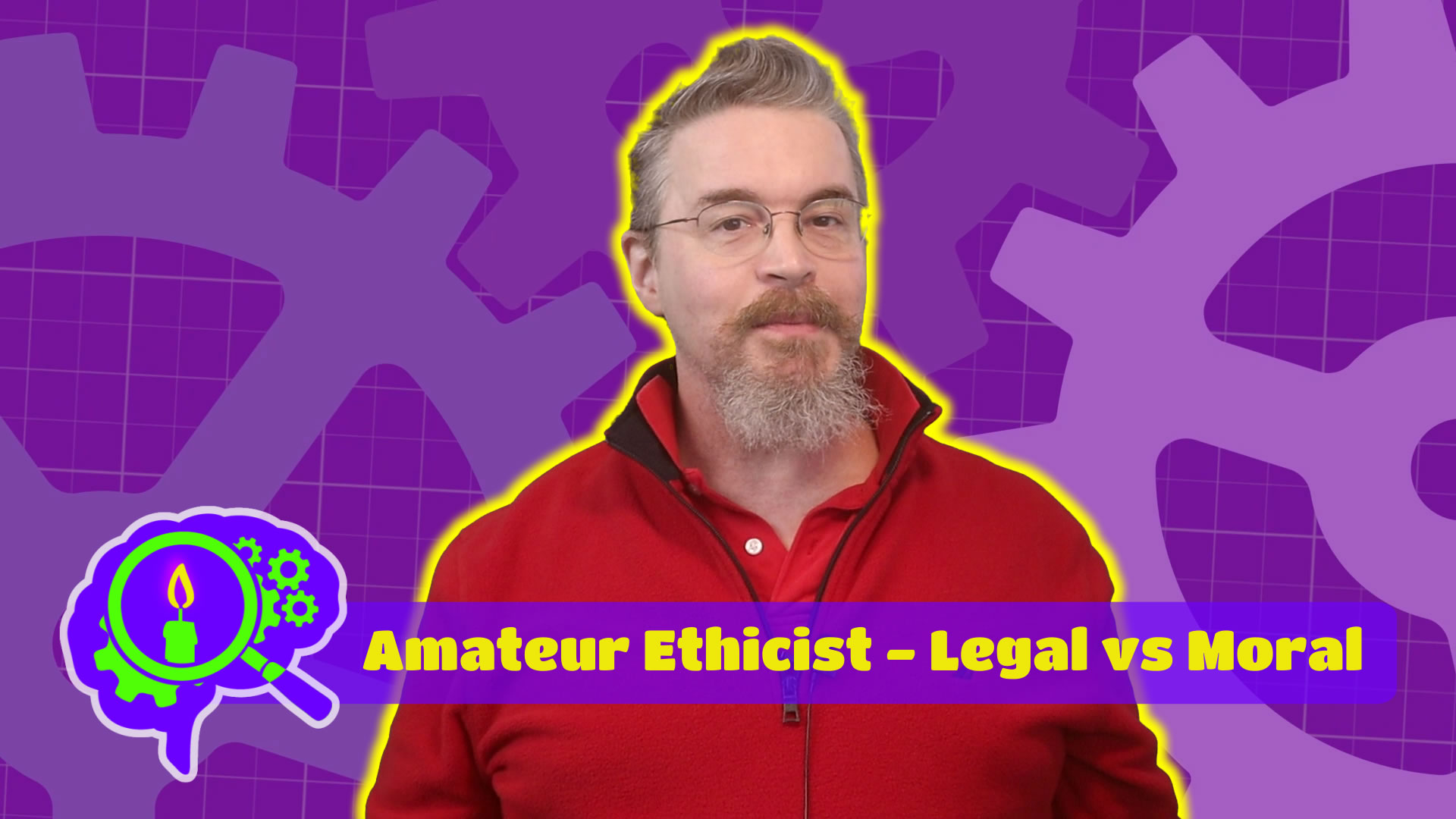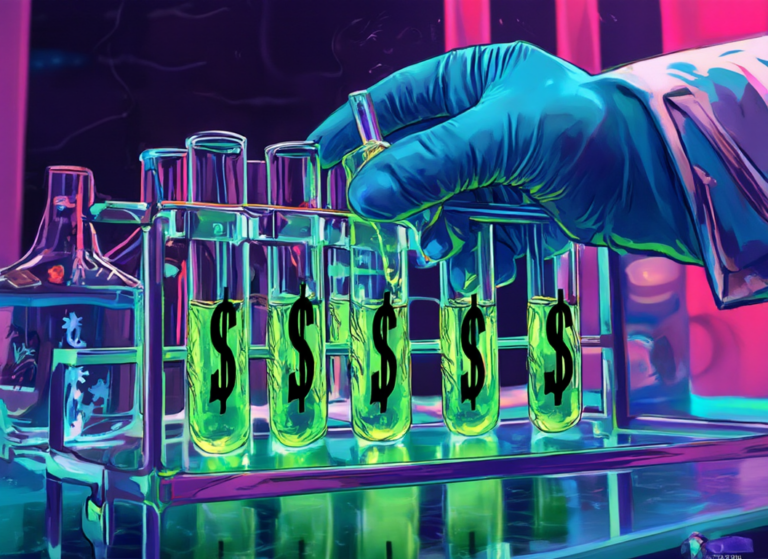Legal vs Moral
Just because something is legal doesn’t mean it’s moral. Likewise, just because something is illegal doesn’t make it immoral. Laws are often grey. That’s the topic of this segment.
Laws. They aren’t always about what’s moral. Sometimes it’s only about what’s legal. In the US, we divide laws into two categories, statute and case law. Statutes are passed by legislators. Case law is decided by judges and historic precedent. The longer a case law has been entrenched, the harder it is to overturn that law because of its historic precedent. Sometimes case law does change, and sometimes statutes contradict case law. Friction between case and statute laws can cause those gray areas, and while it may seem illogical to have more than one way to make laws, it can be seen as a healthy way to insure that laws adapt to meet the needs of those they protect.
Beyond the Constitution, there is older English Common Law from which many of our existing US laws gain their historic precedent. One great example of this is water law. Except, well it’s complicated. Eastern states use what’s called riparian rights. Roughly, if you live next to a body of water, you’re entitled to use some of that water for reasonable purposes, like watering your garden. However, western states have something called prior appropriation, where water is viewed more like a mining claim. If you got there first and made first beneficial use of the water, you get to use that water source in perpetuity as you wish regardless of others needs or desires. I’m simplifying greatly here, but in general, western state new land owners can’t just start irrigating their garden from a local stream if you already own the water in that stream, even if that stream flows right through the middle of that new landowner’s property. In the east, if someone needs water and it’s adjacent to their land, common law suggests under reasonable circumstances that they should be allowed to use it. I live in the eastern states, so I like riparian rights. That said, parts of the western US are pretty parched, so it’s possible a prior appropriation system may be more appropriate for that situation. Frankly it horrifies me, and comes across as more about first-come, first-served greed. But since I don’t live there, I’d be hard-pressed to make a fair assessment. Gross and rough synopsis? The US has — mostly — two different and opposed legal systems for how water is meted out to its citizens depending solely on where you live. Riparian rights are based on really old common law. Prior appropriation rights are… newer. Both are entirely legal, yet drastically different. Without consulting an expert, it’s hard to say whether one is better than the other, good or bad.
Sometimes federal legal precedent is flouted by states. For example, using cannabis as a recreational drug is a federal crime. However, many states have recently legalized the growing, distribution and use of recreational cannabis, all with heavy taxation and documentation by state governments. It reminds me of what happened with alcohol during Prohibition. For almost 13 years in the US, about a hundred years ago, it was illegal to make, distribute or consume alcohol of any kind. Most citizens did all of this illegally anyway for reasons too involved to discuss here. Prohibition wasn’t working. It actually made things worse. So the amendment was repealed, and alcohol became heavily monitored and taxed to reduce the multiple negative effects of mass alcohol consumption on society. While I don’t care for cannabis myself, I see its recreational consumption as less dangerous, non-addictive and just as easy to tax and monitor as alcohol with fewer side-effects. It’s because of stupid policies and propaganda like the Reefer Madness movie of the 1930’s that we don’t have a robust trade in hemp fiber for cloth, paper, rope and cheap fiberboard. There are perennial varieties of hemp that could make an easy living for a hemp farmer with available land and a market for fiber products. It’s an opportunity we’ve wasted for almost a hundred years that should be reconsidered because of its easy best practices for land use, erosion resistant cover, and sustainable return on investment. But it might not be reconsidered because it looks too much like and cross-breeds too easily with the recreational-drug-containing varieties of the same plant. Again, this could be monitored. When you view cannabis use from the same perspective as tobacco and alcohol it’s entirely less harmful, so most sentences for crimes dealing with cannabis probably should be expunged and commuted. Many jails could be emptied. It would just be another stupid recreational drug people spend their money on like alcohol and tobacco. At some point, hopefully our federal government will come to its senses, regulate that hell out of cannabis and gain another tax revenue, just like they did with alcohol and tobacco. Because people are going to do it anyway. I’m not holding my breath.
These recreational drug laws are more about safety and keeping citizens from harming themselves more than anything. Taxing recreational drugs makes it too expensive for people to do it every day or on the job. Because we all know some people would do recreational drugs every day on the job if they could get away with it and it were cheap.
There are a lot of laws that are questionable. Blue laws or laws based on religious belief are a good example. Making it illegal to work or to buy alcohol on Sunday are blue laws. Most blue laws have been repealed, but some counties in some states still have blue laws on the books. Up until a few years ago in a neighboring county, it was illegal to sell alcohol on Sundays. Some people are going to see this as bad. Others will see it as good. Because it was originally a religious law, it makes sense to repeal it. Why? Let’s look at working on Sunday, because there are some religions where working on Saturday or Friday is counter-observant. If you make it illegal to work on Sunday, it comes across as only fair to make work illegal to work on Friday or Saturday too. What’s good for the goose is good for the gander, right? Actually no. Because no one religion is allowed to dominate our laws and no harm is done to society by people working on one day vs another, most religious laws are seen as removal of a liberty. Not everyone observes the same religious beliefs, so we shouldn’t all be held to one particular religious standard. The first Europeans to move here came to escape religious persecution. It’s why we ostensibly have separation of church and state in the US.
Then there are business laws. For example, it’s legal for drug companies to charge whatever they like for life-saving drugs in the US. There is no oversight in the US for overcharging citizens. Every other modern country in the world has laws against this. High prices force some Americans to go to Mexico or Canada for simple things like insulin or epipens. Others do without and die as a consequence of big-pharma greed. Drug designers are not charging more because making the drugs has become more expensive. They’re charging more because it’s legal and the drug company share holders are greedy. Next, drug companies can push specific drugs by giving medical doctors a monetary incentive when they prescribe that drug. Doctors end up prescribing the drug more, even if it’s massively addictive or not even indicated because they want the extra cash. That’s why some states have huge prescription drug addiction problems today. We see the problem. We know the answer. Yet it it’s still totally legal.
There are a lot of loopholes in various laws that allow businesses and individuals to harm others in a chronic fashion that seems invisible until you start seeing the long-term repercussions. Prescription drug addiction is only one example. Another? Styrofoam and plastic one-use disposable containers. They are incredibly convenient. Just toss them in the recycle bin when you’re done, right? Actually, it’s not that simple. The makers of plastic containers mostly use new non-renewable resources like oil to make those containers. A lot of plastic doesn’t get recycled. Most of that plastic gets landfilled using your tax dollars. Because it’s legal and it’s cheaper for the manufacturer than using recycled plastic. Landfilling plastic ends up being a defacto subsidy for plastic manufacturers because they’re not paying for your landfill costs. You are. You pay once for the convenience and then once again when you toss that plastic in the landfill. Then your landfill fees go up when they start looking for new places to dump cheap single-use plastic containers. The remaining plastic that ends up as litter often finds its way to the ocean and ends up on remote beaches or staying in the water permanently and killing wildlife because it looks like food. As a result, now we have several gyres of plastic the size of Texas in multiple oceans across the globe because of our chronic addiction to the convenience of plastic. It’s totally legal to sell plastic and styrofoam. It’s totally legal to make plastic only from virgin resources because they’re cheaper. And it is so damned convenient. But our continued use of plastics is putting the global environment at risk. We’ve just scratched the surface of this particular challenge, but suffice it to say, there’s a lot about plastic that needs to be better regulated because businesses use a least-cost method of operation to accrue the largest possible immediate return on investment, regardless of chronic societal or environmental consequences. If they can get away with it, they will because it’s legal.
Why is using cheaper virgin plastic material still legal? Because it’s ten times cheaper for a big business to send a lobbyist to wine, dine and buy off a few legislators to pass favorable laws than it is to make new plastic items out of recycled content. They see it as a cost of doing business. Long-term consequences be damned.
There are a lot of laws that offer heated debate about the correct direction for regulation. The hottest debates in the US right now are about abortion, gun rights, and racism. These are too emotional to dig into here, but when we look closely at these, usually a loud vocal minority who are taking the most radical positions have religious or racist reasons for wanting to force all citizens to accept their positions, regardless of the harm or threat to the liberty of their fellow citizens.
Sadly, laws are a form of negative reinforcement. Essentially, we punish people for inappropriate behavior. Modern animal behavior specialists agree that positive reinforcement works better. Essentially, we reward preferred or appropriate behavior. Yet negative reinforcement is how laws in most countries work. Serial speeders could get a fine or could lose their license. Serial murderers might face life in prison or execution by the state. The problem is that humans, and in fact all animals, respond better to positive reinforcement. However, I’m unsure how positive reinforcement can be instilled as a legal structure without first severely curtailing freedoms. Surely there must be a balance. If you know of a fair way to create positive reinforcement legal structure, I’d love to hear it!
Owning slaves was once legal in this country. It’s no longer legal because at some point, our citizens found it to be immoral. For over a hundred years, this has been the precedent. It’s backed by additional human rights legislation and international accords that have addressed the topic since the Civil War. It was once illegal in this country for women to vote. But women can vote today, because about a hundred years ago, our country’s legislators found it to be the only moral choice. Since then, this has been the precedent. Yet we still face challenges and loopholes in our laws that make slavery and voter suppression an unfortunate part of our modern landscape.
To recap, laws aren’t about what’s good or bad. They’re mostly about what’s legal and what’s not legal and about historic precedent. Here’s a maxim about laws. “For every one person trying to save the world in one direction there is someone else trying to save the world in the equal and opposite direction.” In cases where there are shades of grey, the question you need to ask yourself is this: Is creating a law that satisfies you stemming from either self-righteousness, religious belief, immediate gratification or the flouting societal and environmental long term sustainability? If so, these are probably bad laws. And be honest with yourself because you and your kids have to live with your consequences. Look closely at the laws in your land. Laws are supposed to protect all the people and the future of those who live under their aegis. Are your laws providing that protection? What would you change about laws where you live? Feel free to comment about this below!







